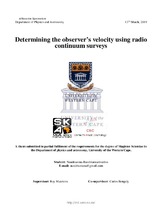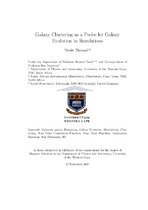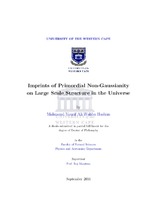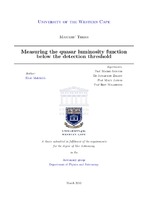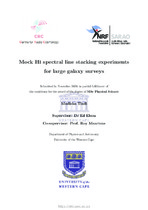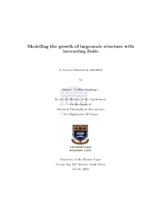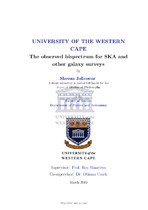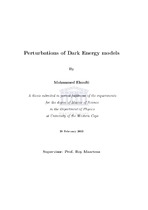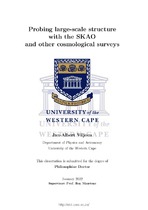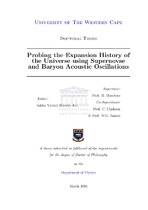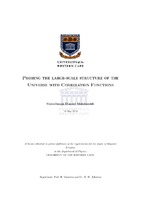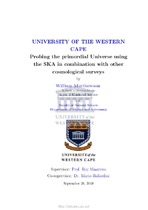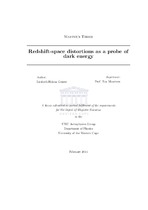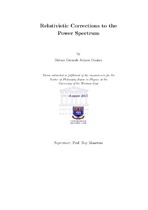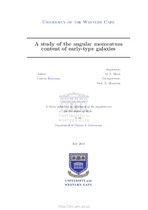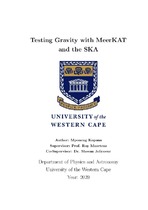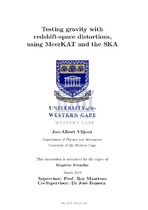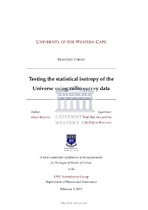Browsing Faculty of Natural Science by Author "Maartens, Roy"
Now showing items 1-18 of 18
-
Determining the observer’s velocity using radio continuum surveys
Randriamiarinarivo, Nandrianina (University of the Western Cape, 2019)In the standard (‘concordance’) model of Cosmology, there is a fundamental assumption that the Universe is statistically isotropic and homogeneous on large scales, known as the Cosmological Principle. The Cosmological ... -
Galaxy Clustering as a Probe for Galaxy Evolution in Simulations
Thomas, Nicole (University of the Western Cape, 2017)Studying clustering on small scales (<10Mpc) over a large span of red- shifts allows us to connect galaxies to underlying cosmic large-scale structure, and thereby provide constraints on the physical processes that drive ... -
Imprints of Primordial Non-Gaussianity on Large Scale Structure in the Universe
Hashim, Mahmoud Yousif Ali Wahba (University of the Western Cape, 2016)Large scale structure in the universe is one of the most important probing tools for cosmological modelling. Assuming the hot big bang model of the universe, the expansion history has undergone two phases of acceleration. ... -
Measuring the quasar luminosity function below the detection threshold
Malefahlo, Eliab (University of the Western Cape, 2016)The radio emission of radio-quiet active galactic nuclei (AGN) is thought to be from star formation and AGN related emission. I investigate these sources using 1.4 GHz radio data from FIRST and three optical quasars samples ... -
Mock HI spectral line stacking experiments for large galaxy surveys
Tladi, Modisha (University of Western Cape, 2019)The study of neutral atomic hydrogen (HI) plays a vital role in improving the knowledge about galaxy evolution since HI serves as the raw fuel for star formation. However, the current knowledge about it is limited to the ... -
Modelling the growth of large-scale structure with interacting fluids
Onchong’a, Okeng’o Geoffrey (University of the Western Cape, 2015)Prevailing astronomical and astrophysical observations suggest that we live in a spatially flat cold dark matter (CDM) universe - currently going through a period of accelerated expansion possibly driven by “dark energy” ... -
The observed bispectrum for SKA and other galaxy surveys
Jolicoeur, Sheean (University of the Western Cape, 2019)Next-generation galaxy surveys will usher in a new era of high precision cosmology. They will increasingly rely on the galaxy bispectrum to provide improved constraints on the key parameters of a cosmological model to ... -
Perturbations of dark energy models
Elmufti, Mohammed (University of Western Cape, 2012)The growth of structure in the Universe proceeds via the collapse of dark matter and baryons. This process is retarded by dark energy which drives an accelerated expansion of the late Universe. In this thesis we use ... -
Probing large-scale structure with the SKAO and other cosmological surveys
Viljoen, Jan-Albert (University of the Western Cape, 2022)In recent history there have been several advances in cosmology, which has significantly shaped our understanding of the Universe. The current leading theory is called ΛCDM, which can successfully model the expansion of ... -
Probing the expansion history of the universe using upernovae and Baryon Acoustic Oscillations
Ali, Sahba Yahya Hamid (University of the Western Cape, 2016)The standard model of cosmology (the ɅCDM model) has been very successful and is compatible with all observational data up to now. However, it remains an important task to develop and apply null tests of this model. These ... -
Probing the large-scale structure of the universe with correlation functions
Matshawule, Siyambonga Donald (University of the Western Cape, 2014)In this project we explore a new statistical package called KSTAT that computes the 2PCF and higher order correlation functions, such as the 3PCF, on BOSS, making use of high performance computing facilities to improve ... -
Probing the primordial Universe using the SKA in combination with other cosmological surveys
Matthewson, William (University of the Western Cape, 2019)Next-generation surveys of the large-scale structure of the Universe will be of great importance in allowing us to extract invaluable information about the nature of the Universe and the physical laws that govern it, at ... -
Redshift-space distortions as a probe of dark energy
Gouws, Liesbeth-Helena (University of Western Cape, 2014)We begin by finding a system of differential equations for the background and linearly perturbed variables in the standard, ɅCDM model, using the Einstein Field Equations, and then solving these numerically. Later, we ... -
Relativistic corrections to the power spectrum
Duniya, Didam Gwazah Adams (University of the Western Cape, 2015)The matter power spectrum is key to understanding the growth of large-scale structure in the Universe. Upcoming surveys of galaxies in the optical and HI will probe increasingly large scales, approaching and even exceeding ... -
A study of the angular momentum content of early-type galaxies
Tshiwawa, Unarine (University of the Western Cape, 2019) -
Testing Gravity with MeerKAT and the SKA
Kopana, Mponeng (University of the Western Cape, 2020)The new 64-dish radio telescope array MeerKAT will be absorbed into the international Square Kilometre Array (SKA) in late 2020s. These two telescope arrays will produce three-dimensional maps of the integrated intensity ... -
Testing gravity with redshift-space distortions, using MeerKAT and the SKA
Viljoen, Jan-Albert (University of the Western Cape, 2019)The growth rate of large-scale structure is a key probe of gravity in the accelerating Universe. Standard models of Dark Energy within General Relativity predict essentially the same growth rate, whereas Modified Gravity ... -
Testing the statistical isotropy of the universe using radio survey data
Baloyi, Mathobela Albert (University of the Western Cape, 2019)The Cosmological Principle forms part of one of the most fundamental hypotheses of modern Cosmology. So it is very important to assess whether it holds true using observational data, or whether it consists of a mathematical ...

